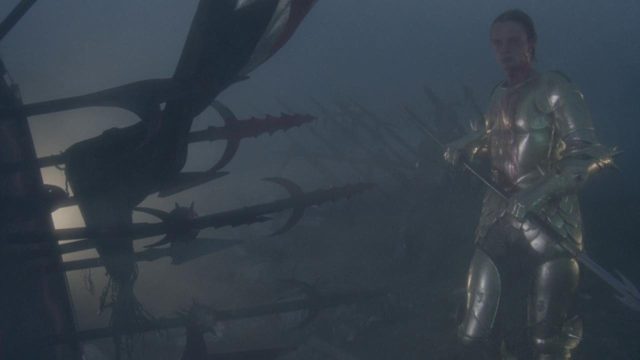Choosing movies for this column can be an awfully subjective job, to the point where I sometimes feel myself trying to weigh whether a movie my dad often watched counts as a “dad movie” or just a product of his personal taste. Take John Boorman’s Excalibur. Was my dad’s love of this movie a product of his interest in Arthurian legend, or is there an intrinsic “dad-ness” that might be worth digging deeper into? Through conversations with other cinephiles and some anecdotal evidence, I was able to find a rather sizable community of people who associate this movie with their father. Even Zack Snyder, a director famed for his loving, supportive relationship with his children, has cited it as his biggest influence.
On some level, this seems surprising. Excalibur is, after all, an ultraviolent fantasy film that sometimes resembles the most expensive porno ever made, miles away from the Westerns, historical epics, and run-’n’-gun action thrillers usually associated with the dad movie. On a surface level, the only hint that Excalibur could fit in the canon is Boorman, director of testosterone-fueled thrillers Point Blank and Deliverance, though Excalibur seems more of a piece with his surreal bombs Zardoz and The Exorcist II: The Heretic. The painterly cinematography, detailed production design, and booming score (which heavily utilizes Carl Orff’s O Fortuna, an affectation that has been so widely parodied in the years since that you have to remind yourself that this is the source of all those parodies) do the heavy lifting to put this film firmly in the realm of fantasy.
By contrast, the script and fight choreography keep the film grounded in reality, and offer clues as to why this movie has been claimed by the dad movie canon. The sword fights resemble those in Monty Python and the Holy Grail minus the jokes: you can see the knights exerting themselves with every swing, thrust, and parry, but the overall effect is brutal and bloody, with enough impalements and dismemberments to satisfy the most bloodthirsty crowd.
The script is the real reason this movie has been claimed by dads, however. Boorman probably saw it as a way to interrogate the synthesis of pagan and Christian influences that forms the basis of Arthurian legend, and while it does function that way on one level, it also combines several tropes common to dad movies, some less savory than others. After an extended prologue where Uther Pendragon (Gabriel Byrne) conceals himself in order to rape Igrayne (Katherine Boorman, the director’s daughter; nothing weird about that!) and ends up fathering Arthur (played as an adult by Nigel Terry), the film skips ahead to Arthur as a teenager, unwittingly pulling Excalibur from the stone and becoming the king of England. It’s here that the movie enters full dad movie mode, as Arthur, with the help of Merlin (Niccol Williamson, whose ham-on-wry performance is the movie’s best) starts recruiting knights for his round table, including Sir Lancelot (Nicholas Clay), Leondegrance (a young((er)) Patrick Stewart), Perceval (Paul Geoffrey), and Gawain (an early performance from dad-movie royalty Liam Neeson). In other words, the first half of the movie becomes the getting-the-team-together narrative familiar from war and heist movies.
The second half of the movie is where the more unsavory aspects come into focus. The brotherhood of the round table finds itself shattered when Lancelot begins an affair with Guenevere (Cherie Lunghi). Arthur’s half-sister Morgana (Helen Mirren) seeks to rule England, and aims to do so by tricking Arthur into fathering a child, Mordred (played by Boorman’s son Charley as a child and Robert Addie as an adult), with her. It would be exceedingly easy to see these two plot threads as sexist, with both of the movie’s major female characters causing the downfall of an empire through underhanded deception. Boorman’s script (co-written with Rospo Pallenberg) does nothing to interrogate the sexism inherent in the legend as it’s been passed down, or to question the semiotics of the Oedipal relationship between Mordred and Arthur. The younger generation is seeking to gain power, and it’s up to the elders to stop them.
Still, it’s somewhat difficult to argue against Excalibur as the definitive modern adaptation of Arthurian legend. Most of its followers have failed by trying to ground the legend in reality, vitally ignoring that the story inherently requires a little nerdiness and dorkiness. It’s telling that perhaps the most successful film in this vein since then has been Robert Zemeckis’s Beowulf, whose script (written by Neil Gaiman and Roger Avery) and visuals owe a great debt to Excalibur. And despite the hatefulness of the film’s second half, it’s kind of hard to dislike a passion project that a director makes with his kids. After all, that’s the real heart of this dad movie.
NEXT TIME: With the school year just around the corner, we cover our first comedy, Back to School!


